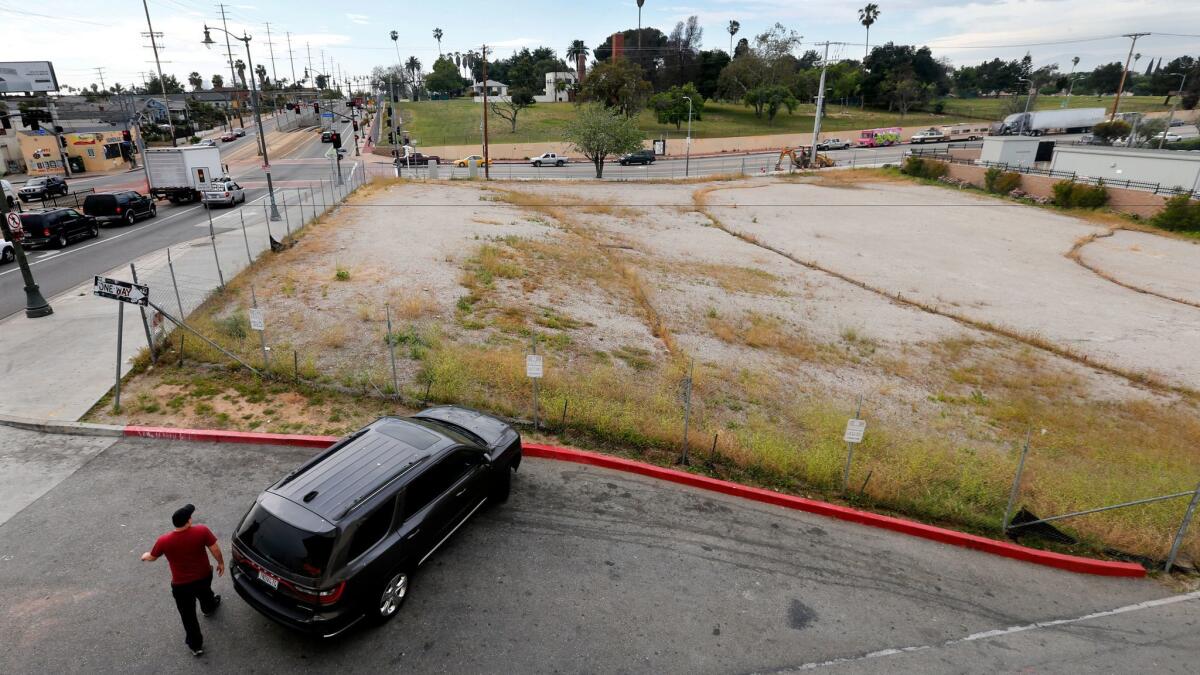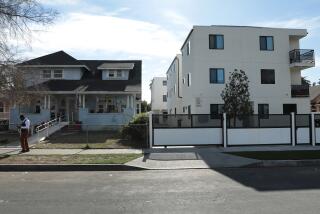Delay for Boyle Heights homeless project shows challenge of building thousands of units in L.A.

A nonprofit developer wants to build affordable housing in Boyle Heights. (April 14, 2017) (Sign up for our free video newsletter here http://bit.ly/2n6VKPR)
A vacant lot between two venerable Eastside landmarks — Evergreen Cemetery to the west and the El Mercado mall to the east — is the focus of a dispute that portends difficulties for the city’s plans to spur the construction of 1,000 units of housing each year for the chronically homeless.
A nonprofit developer has an option to build 49 affordable-housing units on the property, with half of them dedicated to chronically homeless people who have been diagnosed as mentally ill.
It’s exactly the kind of project the city intends to support with the $1.2-billion homeless housing bond that voters approved in November.
But it’s been stuck for nearly a year in the committee headed by one of the most vocal supporters of that bond, Councilman Jose Huizar.
The Los Angeles City Planning Department approved the plan last year. That decision would have been the last hurdle for the developer, A Community of Friends, after nearly three years spent meeting with government and neighborhood groups to come up with a plan that had widespread support.

But one prominent opponent remained: the lot’s next-door neighbor. The family that owns El Mercado — known for Mexican crafts and food and a popular nightclub — appealed the project’s environmental report, saying the project was too dense, would adversely affect schools and libraries, and lacked adequate parking. Since then the project has been stalled, waiting for a hearing on the appeal.
After family patriarch Pedro Rosado died in 2015, his son Tony Rosado took up the fight. He is being represented by attorney Robert Silverstein, a veteran of legal challenges over Hollywood development.
Huizar chairs the City Council’s planning committee, which could recommend either that the full council reject the appeal and allow the project to proceed or require A Community of Friends to do more environmental analysis, up to a costly environmental impact report.
Dora Leong Gallo, chief executive of A Community of Friends, found Huizar’s failure to schedule the hearing ironic considering his support for Proposition HHH in the fall.
Huizar stumped for the bond measure so enthusiastically that council President Herb Wesson dubbed him one of the Three H’s, along with himself and Councilman Marqueece Harris-Dawson.
Gallo said the stalemate reflects the challenges of building housing for the chronically homeless.
The construction of supportive housing in Los Angeles is currently limited to about 300 units a year by competition for scarce subsidies. Proposition HHH will provide funds to greatly increase the pace, but leaders of the mostly nonprofit development community worry that constituent backlash will become a new roadblock.
“This happens everywhere,” Gallo said. “People support it in concept. They think we’re doing an important thing. And then when it comes to being in your neighborhood, it becomes getting over that hurdle. Despite the rhetoric that’s out there, the political will is most in need to get these projects done.”
“What elected people tend to do is reflect the wishes of their constituencies,” said Mike Alvidrez, chief executive of Skid Row Housing Trust, a large nonprofit developer.
What’s needed, Alvidrez said, is for those elected officials to take the lead in convincing communities that projects like the one proposed near El Mercado would make neighborhoods better, not worse.
“Now that we’re faced with the prospect of doing this on a large scale, we need that political support to affirm that is true,” he said.
Huizar did not respond to emailed questions from The Times, and neither Silverstein nor Tony Rosado returned calls.
Huizar and both Rosados, however, spoke out against the project when it was before the L.A. County Metropolitan Transportation Authority board nearly four years ago. Metro was considering an exclusive negotiating agreement with A Community of Friends for use of the land, which had been a staging area during construction of the Eastside’s Gold Line extension.
The Rosados objected to the plan to house mentally ill people there.
Many of the 30,000 people who visit El Mercado every week are children, Pedro Rosado said.
“Our children will be at high risk with mentally ill people only 10 feet away,” he told Metro board members at a public hearing. “Why are you people hiding it and calling it only affordable housing?”
Huizar said he never liked the project, because he thought the location needed more retail businesses.
“We don’t want to create more dead space,” Huizar, a Metro board member, told the hearing. “We want to create more retail space for this location. And it has been significantly reduced.”
Initially conceived as 43 housing units with 26,000 square feet of ground-floor retail space, the plan was changed to 53 units and only 5,000 square feet of retail after Metro built a power substation on the lot that took more space than anticipated.
“I try to stay calm,” Huizar said, his voice cracking with emotion as he castigated Metro staff for changing the plan without consulting him or the community.
“I keep getting misled,” he said. “If I keep getting misled, I can imagine what the community has to put up with. This is unacceptable.”
Gloria Molina, then a member of the L.A. County Board of Supervisors, tried to assuage him, describing her experience with a similar project that had gained community acceptance.
“I can assure you once this is in place, you’re going to be very proud of it,” Molina said. “You should meet with them. You should work with them.”
Huizar cast the only vote against the project.
Over the next three years, Gallo attended more meetings and made additional changes to allay opposition, among them agreeing to reserve half the units for veterans.
In July 2015, the Boyle Heights Neighborhood Council endorsed the final plan — 49 housing units and 10,000 square feet of retail — on a 15-1 vote.
“They tried to engage as many folks as possible,” said Mynor Godoy, president of the Boyle Heights council, who was head of its planning committee at the time.
In response to community requests, Godoy said, the developer made modifications to the lighting and landscaping and agreed to include day care in the retail space. The architect changed the building’s profile to make it interact better with the street, Godoy said.
Gallo said she also eliminated all windows facing El Mercado after the owner’s representative expressed concern that an apartment next door might bring complaints about noise from the popular nightclub.
In March 2016, the L.A. City Planning Department granted the required approvals for height, street setback and parking.
But the green light turned red when lobbyist Harvey Englander filed an appeal on behalf of the Rosados. It challenged the an administrative finding that allowed the project to avoid the burden of a full environmental impact report.
Asked why Huizar had not scheduled a hearing after nearly a year, Huizar spokesman Rick Coca said in an email the councilman was waiting for the parties to negotiate.
Gallo said she offered to discuss changes to the project with the Rosados’ lawyer, but he has not responded or returned her calls.
Gallo said she would be prepared to do more environmental work if she knew what was required.
“Schedule the darn thing so we can have that conversation,” she said. “Why isn’t it being scheduled?”
Huizar’s office said in an email April 7 that it would schedule the issue in May or June.
Meanwhile, time is running out, Gallo said. Metro has twice extended the deadline for conclusion of a development agreement. The deadline is now June 30.
After that, Metro would be free to look for a new developer.
More to Read
Start your day right
Sign up for Essential California for news, features and recommendations from the L.A. Times and beyond in your inbox six days a week.
You may occasionally receive promotional content from the Los Angeles Times.






